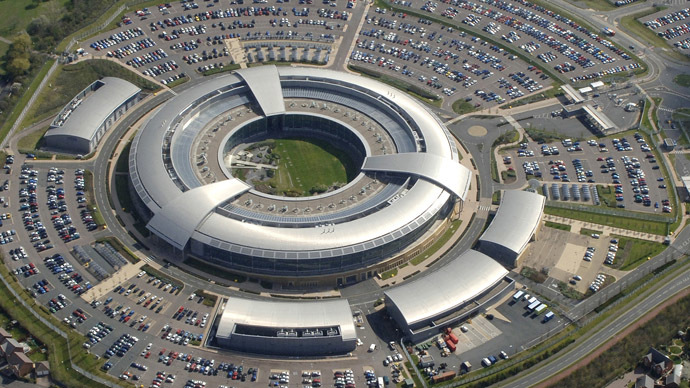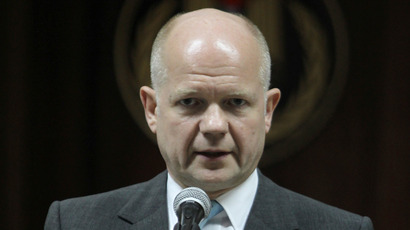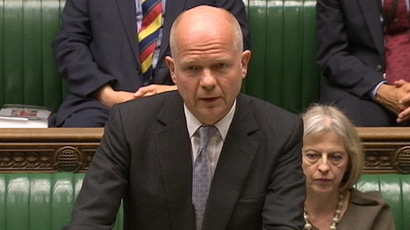British spy agency has access to global communications, shares info with NSA

The British spy agency GCHQ has access to the global network of communications, storing calls, Facebook posts and internet histories – and shares this data with the NSA, Edward Snowden has revealed to the Guardian in a new leak.
GCHQ’s network of cables is able to process massive quantities of information from both specific targets and completely innocent people, including recording phone calls and reading email messages, it was revealed on Friday.
"It's not just a US problem. The UK has a huge dog in this
fight," Snowden told the Guardian. "They [GCHQ] are worse
than the US."

The Government Communications Headquarters agency has two
different programs, aimed at carrying out this online and
telephone monitoring – categorized under ‘Mastering the Internet’
and ‘Global Telecoms Exploitation.’ Both have been conducted in
the absence of any public knowledge, reports the Guardian.
“If you remember, even the NSA said that they did not record
phone calls, but according to these latest revelations by Edward
Snowden, that up to ‘600 million’ telephone events last year were
recorded a day by the GCHQ,” said RT’s Tesa Arcilla from
London.
“There’s no doubt as to what the objectives of these programs
were, having put them in place,” she said, emphasizing the
titles.
The agency is able to store the volumes of data it amasses from fiber-optic cables for up to 30 days in an operation codenamed Tempora. The practice has been going on for around 18 months.
GCHQ which was handling 600m telephone ‘events’ a day, according
to the documents, had tapped into over 200 fiber-optic cables and
had the capacity to analyze data from over 46 of them at a
time.
The cables used by GCHQ can carry data at 10 gigabits per second,
which in theory, means they could deliver up to 21petabytes of
information per day. The program is continuing to develop
on a daily basis with the agency aiming to expand to the point it
is able to process terabits (thousands of gigabits) of data at
once.
“This appears to be dangerously close to, if not exactly, the
centralised database of all our internet communications,
including some content, that successive Governments have ruled
out and Parliament has never legislated for,” said Nick
Pickles of UK privacy campaign group Big Brother Watch.
“If GCHQ have been intercepting huge numbers of innocent
people’s communications as part of a massive sweeping exercise
then I struggle to see how that squares with a process that
requires a warrant for each individual intercept. This question
must be urgently be addressed in Parliament,” he
stated.

By May last year, some 300 GCHQ-assigned analysts and 250 from
the NSA had been specially allocated large quantities of data to
trawl through as a result of the operations.
The Guardian reports that 850,000 NSA and outside contractors had
potential access to the databases. However, the paper does not
explain how it came to such an enormous figure
“These revelations reveal the scale of and the scope of
cooperation between UK and US intelligence services,” said
RT’s Gayane Chichakyan from Washington. “From these
revelations we learned how dramatically it has expanded over the
years.”
“The document shows the FISA court lets the NSA use data
snagged ‘inadvertently.’ They basically give a warrant to target
suspects,” she said, recalling Lieutenant General Keith
Alexander's quote after a 2008 visit to the Menwith RAF base in
England: "Why can't we collect all the signals all the time?
Sounds like a good summer project for Menwith," he had said.
The GCHQ project was first trialed in 2008. The intelligence
organization has been labeled an ‘intelligence superpower’ on
account of its technical capabilities, which by 2010 gave it the
strongest access to internet communications out of the ‘Five
Eyes’ – an international intelligence sharing alliance,
including Australia, Canada, New Zealand, the UK and US, brought
into existence in 1946.

The mass-surveillance has seen the interception of data
from transatlantic cables that also carry data to western Europe
through ‘intercept partners’ commercial companies that had
entered into private agreements with GCHQ. Many have been paid
off for their cooperation.
GCHQ feared that exposure of the names of the companies involved
could lead to “high-level political fallout,” and took
measures to ensure names were kept secret. Warrants had
reportedly been issued to compel the companies to cooperate so
that GCHQ could engage in spying through them.
“They have no choice," said a Guardian intelligence
source.
Human rights groups have spoken out against the mass data
collection: “They are exploiting the fact that
the internet is so international in nature," Shami
Chakrabarti, director of Liberty, told BBC Radio 4's 'Today'
program. "I'm pretty sad in a democracy when all that appears
to be holding back the secret state is its physical and
technological capability and not its ethics or a tight
interpretation and application of the law," she added.
Snowden previously warned that he would be releasing
further information pertaining to mass security operations
carried out on the unwary public, stating in a previous Q
& A with the Guardian that the “truth is coming, and it
cannot be stopped.”














